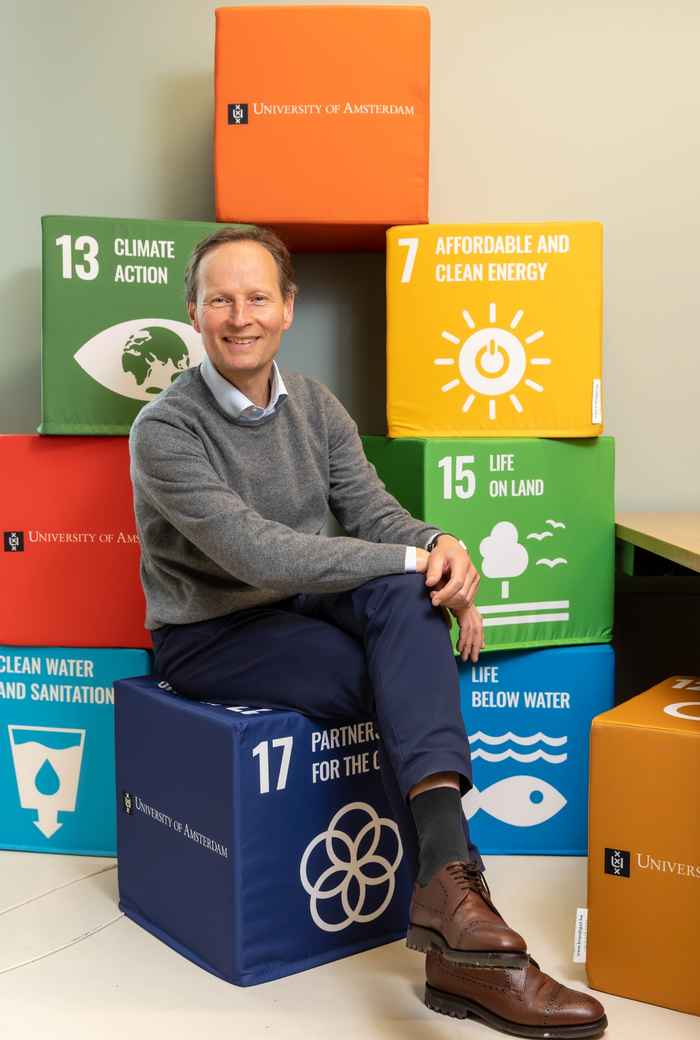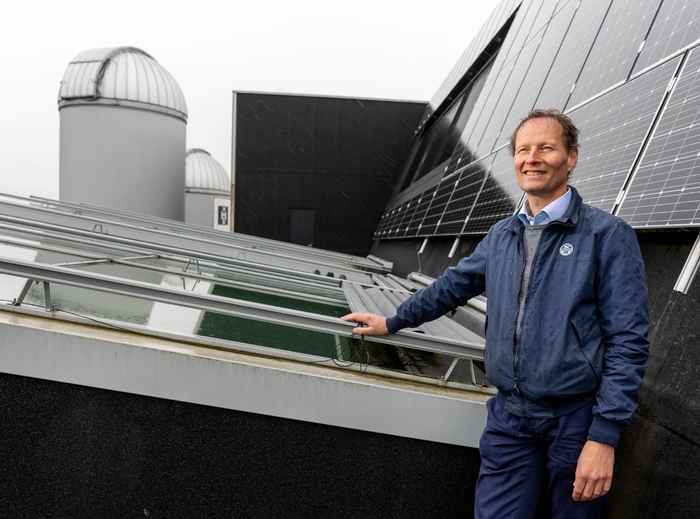Climate targets: collaboration and optimism are essential for the energy transition
Interview Professor Bob van der Zwaan
28 July 2022
Van der Zwaan has been working to make the planet a better place ever since he first started out in the world of science. He does not just talk about changes; he does everything he can to make sure they actually happen. ‘Climate change is one of the greatest challenges of our time. I feel it’s my duty to play my part in helping to solve it,’ says the scientist, who is affiliated to the Van 't Hoff Institute for Molecular Sciences.
Van der Zwaan is helping to fight climate change in two ways: He spends just under half of his time as professor of Sustainable Energy Technology at the UvA and spends the rest working for the TNO Energy Transition innovation institute. This combination works perfectly for Van der Zwaan. At the UvA, his research is more fundamental, while at the Netherlands Organisation for Applied Sciences (TNO), he looks at how this research can be applied.
Renewable energy
In the ’90s, Van der Zwaan was interested, among other things, in the role that nuclear energy can play in the energy transition. In his view, this is now no longer a realistic option for many countries. Instead, the UvA professor’s main focus is thus other sources of energy.
‘Renewable wind and solar power has now become so cheap – and prices are still falling – that, here in the Netherlands, we must invest heavily in these sources,’ says Van der Zwaan.
His current research therefore focuses primarily on renewable energy that, in his view, offers the best chance of helping us meet the Paris climate targets. He looks, for example, at the costs and cost reductions of individual energy technologies such as wind and solar power. Van der Zwaan is also researching how, together, these two sources of energy can meet our energy demand in all sectors of the global economy.
Through his modelling studies of energy systems, he contributes to the major international reports of the Intergovernmental Panel on Climate Change (IPCC), which, every seven years, set out energy and climate change scenarios for this century.
From reduction to negative emissions
‘We can only see a short distance ahead, but we can see plenty there that needs to be done,’ is how world-renowned mathematician Alan Turing put it. The same applies to the current energy transition. In the meantime, however, Van der Zwaan and his colleagues are already working on the phase in which it is no longer only about rapidly reducing emissions of greenhouse gases, which is the main goal at the moment. Instead, they already now put emphasis on how to achieve negative emissions after 2050.
‘In 30 years, according to the Paris Agreement, CO2 emissions must be negative. This means that we as a society are entering another phase,’ explains Van der Zwaan. ‘We are focusing on the question of how we can achieve these negative emissions. In other words, it’s no longer just about preventing emissions, it’s about how we can remove greenhouse gases, particularly carbon dioxide, from the atmosphere.’
Multidisciplinary approach
Working closely with other disciplines is key in climate research, says the professor: ‘If we are to be in a position to tackle the major climate issues that we are facing, we have to think beyond our own disciplines. There’s a huge amount of work to be done, by all of us, and the most important thing is that we do it together. The point is that there are obstacles on every possible level: from technology and costs to legal and organisational aspects.’
He is promoting this multidisciplinary approach both within the UvA and externally. For example, from his base at the Faculty of Science, he has launched the seminar series ‘Future of Energy’, in close collaboration with the UvA’s Institute for Advanced Study (IAS). In early 2022, the UvA-wide Research Priority Area ENLENS was launched on the basis of this series. Here, scientists from a variety of disciplines conduct research into the energy system and the energy transition in the context of the Sustainable Development Goals (SDGs).
Inspiration
Teaching is at least as important to Van der Zwaan as his research. After all, climate change is an issue that affects our future generations. In addition to teaching at the UvA, he teaches at Johns Hopkins University in Bologna.
‘I find teaching young people hugely inspiring. They are so motivated and engaged. These students really want to help the planet, because they know there’s no alternative. I try, wherever I can, to tell them a positive story, without being dishonest about the negative aspects.’
Because what applies to our climate crisis also applies to his students: ‘There’s no alternative for optimism.’
Annual review Faculty of Science 2021
This interview was also published in the annual review of the University of Amsterdam Faculty of Science. Read our annual review for news and background on teaching and research at the Faculty of Science in 2021, including interviews with lecturers, researchers and students, facts and figures on enrolment and staff news about organisation developments and our valorisation activities.

